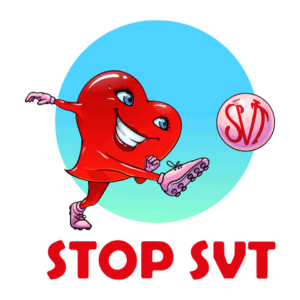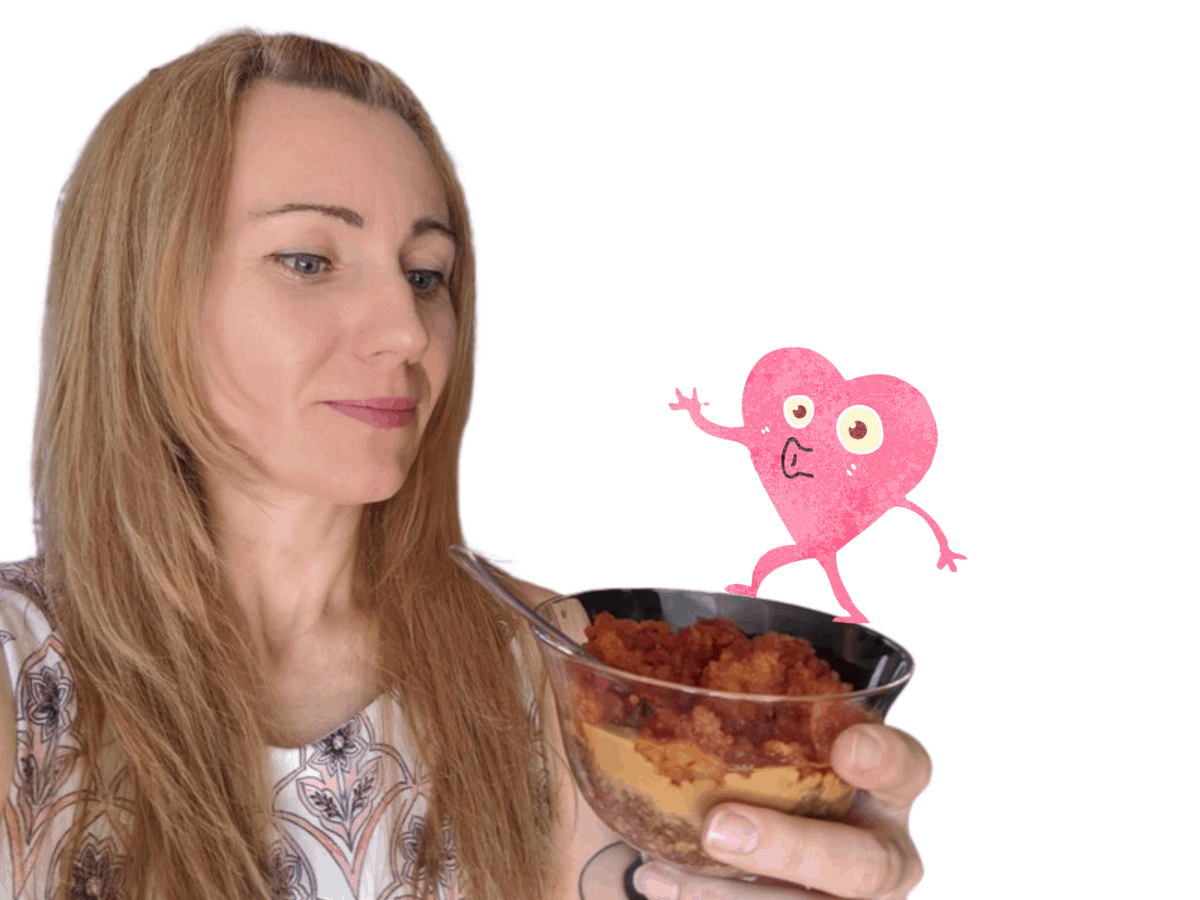Other peoples’ stories are such great inspiration. Their success removes doubts about what can be achieved in terms of health. It empowers us to believe that we, too, will one day be asymptomatic and SVT free.
The other day I purchased a book titled Raw + Free; plant-based living for health + happiness written by Sophie Steevens, and I read her story.
Numerous studies show that an unhealthy diet is the most critical risk factor for cardiovascular disease, and SVT is a type of arrhythmia. Starting the day with whole grains, fresh fruits, and heart-healthy spices for breakfast can reduce inflammation, cholesterol, and oxidative stress.
The intake of nutrients, antioxidants, vitamins, and minerals that the heart needs to be healthy substantially increases by changing eating habits.
Table of Contents
Sophie’s story
In 2014, Sophie was living in Bali with her family when she suddenly became ill with typhoid fever.
She went to the hospital.
They did some tests and discovered that she had a lump on her throat due to an extremely overactive thyroid gland.
A few weeks before her hospitalization, Sophie had noticed some symptoms, such as a racing heart and feeling jittery.
My heart rate was always high — it felt as though I had just been on a long run, even though I was resting.
Sophie Steevens
She and her family decided to leave Bali and head home to New Zealand to find out what was happening.
In Denpasar airport, while checking in for their flight, Sophie endured a dangerous episode of atrial fibrillation.
When she got to New Zealand, she consulted a top endocrinologist in Auckland who diagnosed her with Graves disease, an autoimmune disorder that causes the thyroid gland to be overactive.
She was placed on medications, and after a year of taking them, Sophie found out that her ongoing treatment would involve taking radioactive iodine, which means she would then need to take a hormone to replace the function of her thyroid gland for the rest of her life.
The other option was to have the thyroid gland removed, but that had even more risks involved.
Sophie refused to accept that these were the only two options available.
She began doing some research on other ways to treat hyperthyroidism.
What we eat, drink, breathe, put on our skin, think and feel affects our health.
Sophie Steevens
Like many of us, Sophie was determined to find another way to remedy her illness, and she already had a basic idea of the positive health effects of a plant-based diet.
She switched her diet to that that is entirely plant-based in no time at all.
Sophie Steevens believed that she could reverse her Graves’ Disease through diet; that belief led her down a path that involved a drastic detox and a total commitment to eating in a new way.
She did it!
Sophie has been symptom-free for more than three and a half years, and her blood tests are normal.
Atrial fibrillation is a type of SVT but is a more severe condition; it leads to blood clot formation and increases stroke risk. Graves’ disease is an autoimmune condition with no known cure.
It is a jaw-dropping phenomenon how food could reverse such severe conditions like atrial fibrillation and Graves’ disease, knowing that there is no cure for them from what doctors tell us.
Supraventricular tachycardia is not a life-threatening condition.
From what I have read and from my own experience, I am very inspired and motivated to believe that a non-life-threatening arrhythmia, such as SVT, can also be managed with a plant-based lifestyle.
What To Eat For Breakfast To Beat SVT?
Lifestyle habits, such as being sedentary plus having an overall unhealthy diet, have resulted in the development of chronic diseases, and the heart seems to be the most affected organ.
What to eat to beat SVT? We will consider food as our medicine.
Oats, ground flax, cinnamon, peanut butter, and apples are among the healthiest options when it comes to choosing our breakfast.
A whole food planted based diet is the only diet to prevent and reverse heart disease, therefore promoted by so many top cardiologists.
Some of the plant-based doctors that worth check them out are:
- Dr. Joel Kahn, Dr. Kim Williams, Chief of the Division of Cardiology at Rush University in Chicago,
- Dr. Baxter Montgomery, the founder, and president of the Houston Cardiac Association (HCA),
- Dr. Esselstyn, who saw and treated Bill Clinton in 2010,
- Dr. Michael Greger, the founder of nutrition facts
- Dr. Michael Klaper,
If we are suppose to follow the model of the longest-lived people in the world, our carbohydrate intake should be in the proportion of 60% to 80% of total macronutrients.
Here we are talking about complex carbohydrates, ie whole foods as we find them in nature.
The science behind real food ingredients
Oats
The heart benefits of eating oats are as follow:
Oats lower cholesterol
The many advantages of eating oats and oats-based products on blood cholesterol levels and other cardiac conditions have undoubtedly been proven in numerous amounts of scientific studies, clinical trials, and observations.
Beta-glucagon found in oats is a type of dietary fiber linked to reducing harmful cholesterol levels and improving heart health.
25% of our total cholesterol comes from the food we eat.
Saturated and trans fats we eat from animal meats and dairy will end up in the liver, transformed into cholesterol.
Beta-glucan fiber from oats can grab or stick into the intestine to some saturated and trans fats, preventing them from getting to the liver and being transformed into cholesterol and removing them with the stool.
As a result, the cholesterol level decreases.
However, not all food products containing beta-glucan seem to lead to the same health outcome.
Sources of fiber that have been overly processed will have their fiber tissue disrupted; this means that they will be less effective at reducing cholesterol levels within the blood.
One such example of this is instant oats, which is why it’s best to use rolled oats.
Rolled oats still have some amount of plant-based tissue intact; thus, it is filled with unrefined beta-glucagon.
The actual dietary intake and benefits are dependent on the part of the grain consumed and how it has been processed, so be sure to choose the oat products with less processing.
Several researchers have pointed out from their studies that having as little as 2.9 g per day of oat extract can facilitate a 9% decrease in LDL cholesterol (bad cholesterol) levels.
You may be wondering what cholesterol has to do with my SVT?
Maybe you never think of it but there is a relationship between cholesterol and heart rate.
One study looked at this link and got the following conclusion:
Men with heart rate >89 beats per minute had 14.5% higher non-HDL (bad) cholesterol and 36.3% higher triglyceride levels than men with heart rate <60 beats per minute. The corresponding differences in women were 12.5% and 22.2%.
Association Between Heart Rate and
Atherogenic Blood Lipid Fractions
in a Population
The Troms0 Study Kaare H. B0naa, MD, and Egil Arnesen, MD
It may suggest that a constant higher heart rate could signal other heart problems like high cholesterol.
I know among many of us who have SVT, we also have a slightly elevated heart rate in general. So, I believe this is something to think about.
Maybe the SVT symptoms are not so benign as we were told after all and correlated with other issues like obesity, stress, poor diet, and a sedentary lifestyle could lead to high cholesterol levels.
We certainly need more research on this topic in order to understand the correlations that exist between SVT symptoms and heart disease.
100g of oats contain 4g of the beta-glucan fiver.
Oats keep your blood glucose in balance
The beta-glucagon found in oats also slows down the absorption of carbohydrates into the bloodstream and prevents sudden spikes in blood sugar and insulin levels.
Oats contain Magnesium which relax blood vessels
Besides being rich in fiber, medical and nutritional professionals have often encouraged patients to consume oat for other reasons, as it is an excellent source of macronutrients, vitamins, and minerals.
Magnesium, found in abundance in oats, plays a prime role in enzyme function in preventing heart attacks and strokes.
It does so by aiding with the relaxing of blood vessels, the pumping action of the heart muscle, and regulating blood pressure.
Magnesium dilates blood vessels, facilitating blood circulation. The blood will be able to reach organs and tissues faster and easier. Also, it helps reducing ectopics according to studies.
Oats have anti-inflammatory and antioxidant properties
Scientists and researchers have found that oats can protect the heart due to a unique compound. The compound is called avenanthramide (AVE); it has antioxidant and anti-inflammatory properties, which are excellent features for heart-healthy foods to have.
Flax
Falx lowers cholesterol
Flax is loaded with nutrients and is exceptionally high in fiber.
As reported by many medical professionals, including flax in your diet daily increases heart health and significantly reduces the risk of your arteries hardening, as it decreases the effect and amount of cholesterol within the body.
Researchers believe this gets accomplished when fiber binds to cholesterol in the intestine and prevents it from being absorbed.
Flax has anti-inflammatory and antioxidant properties
The risk of oxidative stress in the blood vessels can also be lowered by flaxseed intake.
Flaxseeds are the number one source of lignans in human diets. Lignans offer antioxidant protection and also shield blood vessels from inflammatory damage.
Long-term oxidative stress (an imbalance between free radicals and antioxidants in your body) damages the cells and causes chronic inflammation, which studies showed can lead to SVT.
Cinnamon
Cinnamon reduces cholesterol
This delicious, fragrant, and versatile spice is an excellent source of manganese, antioxidants, and fiber; it is also quite a good calcium source. One study shows that a daily intake of up to 6 grams of cinnamon reduces cholesterol.
Cinnamon has antioxidant properties
Cinnamon also lowers blood sugar, decreases inflammation, and has powerful antioxidant properties.
Among spices, cinnamon is one of the most powerful antioxidants. Spices are richer in antioxidants than plants. A small amount of cinnamon, like one teaspoon, could boost our daily antioxidant intake considerably.
Peanut Butter
Peanut butter reduces cholesterol
The vitamins and nutrients, including niacin, folate, and protein, in addition to the monounsaturated fat content found in peanuts, have been shown to reduce cholesterol and promote heart health.
Peanuts and peanut butter contain monounsaturated fat, a type of healthy dietary fat that is liquid at room temperature but solidify when chilled.
It also contains polyunsaturated fat, a healthy dietary fat that lowers LDL (bad) cholesterol, and keeps HDL (good) cholesterol high.
Having too much bad cholesterol within the body will negatively impact your heart, causing your arteries to get clogged up and slowing down blood flow.
This forces your heart to work harder, so peanut helps your heart by reducing bad cholesterol.
Vitamins such as vitamin E, vitamin B6, and minerals such as potassium and magnesium are needed by the heart to stay in tip-top condition. Thankfully peanuts naturally have low amounts of saturated fat and are bursting with those essential vitamins and nutrients.
Peanuts offer antioxidant protection
Also, peanuts provide resveratrol, the phenolic antioxidant that is thought to be responsible for the French paradox; in France, people consume a diet that is not low in fat but has a lower risk of cardiovascular disease compared to the U.S.
Nut consumption has been proven many times to be associated with reduced cardiovascular disease (CVD).
In a study published in 2017, the associations between the intake of total and specific types of nuts and cardiovascular disease were examined.
The results indicated that the consumption of peanuts and tree nuts two or more times per week was associated with a 13%-19% lower risk of total cardiovascular disease and 15–23% lower risk of coronary heart disease. The study included 5,063,439 persons and years of follow-up.
Apple
Apples are high in antioxidants
Apples are packed with antioxidants, vitamins, and fiber.
According to epidemiological studies, the flavonoid component found in apples’ skin has antioxidant properties that protect against cardiovascular diseases.
Flavonoids are chemicals found in plants that help our body in the fight against free radicals.
They also provide antioxidant protection within blood vessels improving endothelium function.
Fiber and flavonoids are found in high concentration in apples’ skin. Of the 4 grams of fiber contained in the apple, 2 grams are found in the skin.
Apples reduce cholesterol
A one-year clinical study showed that the consumption of 75 grams of dried apples per day in postmenopausal women led to a 23% reduction of LDL (bad cholesterol).
Apples contain potassium
A medium apple contains approximately 150 mg potassium which is an important mineral for the proper functioning of the heart’s electrical circuit. A low level of potassium can cause arrhythmia.
Important SVT note
The cardiovascular risks are multiple. We can mention
- stress
- inefficient or lack of sleep
- high cholesterol
- smoking
- alcohol consumption
- obesity
- inadequate nutrition, and
- lack of exercise.
Even though, in reality, there are more risk factors, for the sake of this example, let’s say there are 8.
If I can control 7 of them, but I only neglect food, this single ignored element can lead to coronary heart disease over time.
We must keep in mind all the risk factors if we are going to have a healthy heart. Just because we are on medication for heart disease, be it hypertension or SVT, does not mean that we are out of any danger as long as we do nothing to improve our risk factors.
Heart Healthy Breakfast Oatmeal
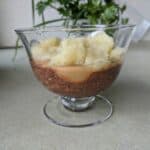
What we eat must be designed in such a way as to improve our heart health. Oatmeal is my favorite breakfast to keep SVT away. Each ingredient has the ability to reduce cholesterol, inflammation, and oxidative stress, all of which can change for the better the arrhythmia we have.
All ingredients are whole foods that deliver complex carbohydrates packed with 12 grams of fiber, ensuring a slow release of blood glucose. This breakfast meal helps maintain constant energy levels and makes you feel full longer while protecting your blood vessels.
- 28 grams Rolled Oats ((or 2 tbsp))
- 7 grams Ground Flax ((or 1 tbsp))
- 1.5 grams Cinnamon ((or 1/2 tsp))
- 10 drops Vanilla Essence
- 28 grams Peanut Butter ((or 2 tbsp))
- Water
- 1 Apple
Combine the oats, cinnamon, flax, and vanilla in a bowl. Turn on the kettle.
Add hot water and stir occasionally. Let it sit for 10 minutes.
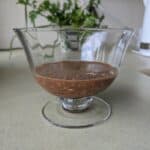
Add the peanut butter but don’t mix with the other ingredients.
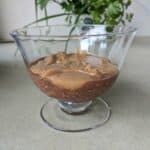
Grate the apple on the fine-sized side and add it on top.

Don’t peel the apple. Due to its content of flavonoids, an apple a day (100-150 grams) lowers the risk of all-cause mortality by 35% but only if consumed with skin.
Use only True Cinnamon (Cinnamomum zeylanicum), which has a very low content of coumarin, a substance considered toxic to the liver.
